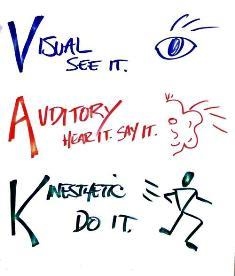|
From Damien of Lodge Devotion
I think every Freemason asks this and finds their own answer.
In the Second and Third Degrees, candidates are expected to demonstrate proficiency in the former degree by answering set questions with set answers without deviation. This can be a little daunting to men who have never had to do such a thing, but being a set script - you can take heart that there will be no surprise questions in the Victorian Constitution! Candidates are also supported by the deacons if needed, but it is always nice to try andhold your own and not require assistance.
Broadly speaking - there are visual, auditory and reading/writing learners. However, there are other sorts in educational theories and methods. For instance kinesthetic learning is a learning
“Visual, auditory and reading writing learners” What that means is some people learn by looking, some by hearing and others by writing - but you will find most Freemasons use a mix. The important thing is to be able to give lines without a book or papers, and be comfortable and confident doing so – which requires work and repetition.
Time, work, repetition and practice are key.
I used to keep material in the car, look at it at red lights, and then try to recall it by memory when driving. I break lines down on a phrase or sentence by sentence basis with constant review. This method is essentially how I still learn ritual.
Here is an example using a poem;
William Shakespeare - Sonnet #18
Thou art more lovely and more temperate: Rough winds do shake the darling buds of May, And Summer's lease hath all too short a date: Sometime too hot the eye of heaven shines, And oft' is his gold complexion dimm'd; And every fair from fair sometime declines, By chance or nature's changing course untrimm'd: But thy eternal Summer shall not fade Nor lose possession of that fair thou owest; Nor shall Death brag thou wanderest in his shade, When in eternal lines to time thou growest: So long as men can breathe, or eyes can see, So long lives this, and this gives life to thee.
I would read the whole poem a few times and then initially concentrate on the first few lines and no more.
Shall I compare thee to a Summer's day? Thou art more lovely and more temperate: Rough winds do shake the darling buds of May, And Summer's lease hath all too short a date:
Learn the first line (easy) and then build upon it with constant revision.
Read Shall I compare thee to a Summer's day? Shall I compare thee to a Summer's day? Shall I compare thee to a Summer's day?
Say without reading Shall I compare thee to a Summer's day? Shall I compare thee to a Summer's day? Shall I compare thee to a Summer's day?
Read again Shall I compare thee to a Summer's day? Shall I compare thee to a Summer's day? Shall I compare thee to a Summer's day?
Say again without reading Shall I compare thee to a Summer's day? Shall I compare thee to a Summer's day? Shall I compare thee to a Summer's day?
Check you know it without reference to the written material. Wait and then see if you can recall it in a few minutes and expanded the time between recalling the lines.
Correct any errors you find in your reproduction of the lines.
Many learners would follow a “read” then “write” and then “say” process.
Once those lines are learnt, I would move to the next line or phrase.
Depending on natural ability, you might learn two lines at once.. maybe more - but few can tackle whole slabs at once. Also, you might have heard these lines in lodge several (or many!) times and they might come really quickly. That’s “auditory learning”.
Then I would move onto the next lines, still repeating the first. When learning a paragraph, I might just repeat the start of the paragraph – but also often start at the beginning of the entire charge to revise that as well and ensure I know the flow of the charge. For candidates and their questions and answers; practice the entire answer. I would also learn the questions at the same time.. like a play, you need to thoroughly know your own lines and at least be very familiar with the lines of the person you are responding too, if not learning those too.
Shall I compare thee to a Summer's day? Thou art more lovely and more temperate:
Then I would concentrate on the second line above, but still start with the first... following the same method above – “read” and “say”. If on a train or other public place, you can still use the above method – but only “saying” these words in your head rather than aloud – but make sure you practice them aloud at some point
Once I was comfortable – I would move onto the next line, and so forth.
In many jurisdictions of Freemasonry, lines cannot be (or simply are not) written down and are learnt by rote “mouth to ear”. This means an experienced Freemason instructing another brother in the ritual by the adept man saying it and the novice listening and then repeating it. Some brothers are lucky and talented enough to learn lines purely by hearing them in lodge.
For some of us, this is auditory method is more effective than the “reading and repeating” method I mainly use, however I too use a component of auditory learning – both in lodge by active listening but also outside the Lodge. With ipods, mp3 players and mobile phones which record voice, you can put ritual on such a device and listen to it. With many of us carrying these devices all day– you have easy access to ritual on your phone or iPod. I keep these recordings in a password protected file on my phone’s memory card. Planned Learning for success I would often also work out a learning schedule..
For instance; if there was a month before I had to give a charge.. and had to learn 30 sentences – I would look at two sentences per day (and you might well find you can move faster) – this would give half the time to all important revision rather than learning anew. However the key is once you know something - you probably only think you do. Leave time to revise without written (or auditory) material... say at least a week ... but the more the better for the work to take to your long term memory.
It is also important at some point to be rehearsing these as you will say them – aloud and with confidence. Perhaps even in front of a small audience of brethren at someone’s home or by attending rehearsal. Leaving yourself time to do that by learning them early helps a lot and sets you up to really do well in open lodge.
You will also probably find you know something and then forget it.. so leave only small spaces between revisions to make material easier to recall from your short term memory.. I used to do them in the morning - and again on the way home in the car.. the period of time between learning and revision can increase once you get more experienced and familiar with your work.
those around you.
Once you feel you are on top of them – proposers and mentors can practice them together with the candidate, but any Master Mason should be able to run through questions with candidates.
Hope that does not sound too hard - because it is not.. In essence – can you learn a single sentence a day? If you can do that – you are in business and will move more than fast enough to be passed to the second degree and then raised to the third.
And you already can learn ritual – because I am sure you know a saying, joke, address, prayer or song words - so you can already commit lines to memory – you just might not realise it :)
Hope that helps ... but in all things – it is often good to ask others to see how they do it and if their method is more time effective for you than what I have offered ... use it!
|
|
|





